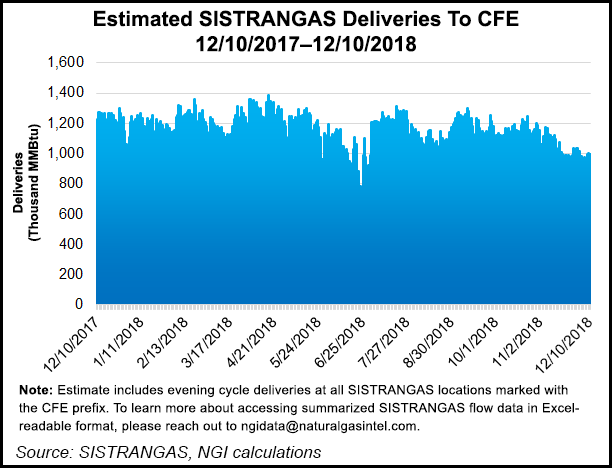NGI The Weekly Gas Market Report | Mexico | NGI All News Access | NGI Mexico GPI
Mexico President Outlines State-Centric Vision for Power Sector
Mexican President Andrés Manuel López Obrador affirmed last weekend plans to shift course at state power utility Comisión Federal de Electricidad (CFE).

At the unveiling of his national electricity program on Saturday at the Malpaso hydroelectric plant in Chiapas state, López Obrador equated the “neoliberal” policies of the last 36 years in Mexico to the 1876-1911 dictatorship of Porfirio DÃaz. He said the reforms of his predecessor Enrique Peña Nieto had weakened the state power company and caused higher prices.
The 2013 constitutional energy reform sought to attract investment in power generation capacity — namely renewables, combined-cycle gas turbines (CCGT) and cogeneration — through long-term supply auctions, with CFE as the offtaker.
CFE is also the anchor customer for a historic buildout of natural gas pipelines by the private sector that began in 2012, an initiative that has resulted in the addition of 4,639 kilometers (2,883 miles) of pipe to the national grid so far.
The new infrastructure is meant to transport gas produced in the United States, as well as in Mexico, to Mexico’s growing fleet of CCGTs as part of a larger effort to replace aging and inefficient thermal plants.
The Prodesen 2018-2032 power sector outlook published in May by energy ministry Sener recommends decommissioning 11 GW of conventional thermal capacity, to be replaced by more efficient CCGTs, renewable, and cogeneration. The report calls for 9.2 GW of CCGT capacity by 2022 and 28.1 GW by 2032, figures which are the driving force behind forecasts of continued growth in demand for U.S. gas imports over the coming years.
However, López Obrador and CFE’s new CEO Manuel Bartlett DÃaz left no doubt on Saturday of their skepticism of each of these initiatives. Neither mentioned CCGT plants or cogeneration in their speeches. They instead focused on the need to modernize and increase the capacity of Mexico’s existing conventional hydroelectric and thermal plants.
Bartlett said under his leadership, CFE will not allow end-user electricity prices to increase past the rate of inflation, and that CFE will invest in renewable energy to reduce dependence on imported gas. He made no mention of asking the private sector to participate in this effort.
The so-called neoliberal era brought with it “a program of dismantling” CFE and closing public plants “to give preference to foreign companies” that sell electricity to CFE, López Obrador told the audience.
“This is the crux of the whole matter: to take control of the market…” He noted that in 1992, the government “began to award concessions to individual companies,” referring to the independent power producer (IPP) scheme through which CFE purchases electricity from private-sector generators.
The IPP mechanism, combined with the more recently implemented auctions, means that CFE now “must purchase half of the energy that’s consumed, at elevated prices,” López Obrador said. He added, “all of this we have to revise.”
Bartlett said this year, “with the change in political regime, CFE is preparing to overcome the situation of abandonment and lack of dynamism in which it finds itself. In the face of financial difficulties, with extraordinary efforts of efficiency and austerity, CFE will strengthen its investment capacity in order to slow down the purchase of electricity and produce its own.”
The comments, which followed the indefinite postponement last week of a power supply auction previously scheduled for next week (Dec. 18), should be interpreted as a direct criticism of both the IPP scheme and the auctions, according to GMEC energy consultancy founder Gonzalo Monroy.
“These guys do not believe in the market,” Monroy told NGI. “Not only market mechanisms, but in the market itself.”
Monroy also pointed out that Bartlett has been an outspoken critic of the IPP program over the last two decades. “In his view, all electricity has to be produced by the Mexican state,” he said.
Bartlett also expressed distrust of CFE’s role as anchor customer for the new pipelines, and of the pipeline expansion itself.
“The financial situation of CFE is critical,” Bartlett said. “Financial obligations for natural gas transport contracts bring a heavy annual cost.” He later tweeted, “We will audit the network of gas pipelines developed by previous administrations, since they cost [CFE] an investment of $15 billion and high interest rates without contributing anything.”
Bartlett and López Obrador also decried the “arbitrary closing” of CFE power plants, with Bartlett going so far as to say that their deterioration was “deliberate.”
“Not one more plant will be closed,” López Obrador said. “The policy of closing the CFE’s power plants is over.”
© 2024 Natural Gas Intelligence. All rights reserved.
ISSN © 1532-1231 | ISSN © 2577-9877 | ISSN © 2577-9966 | ISSN © 1532-1266 |
